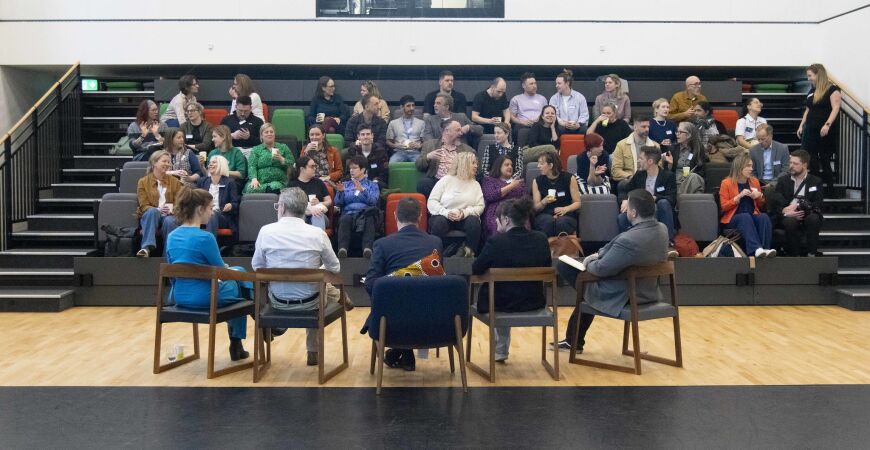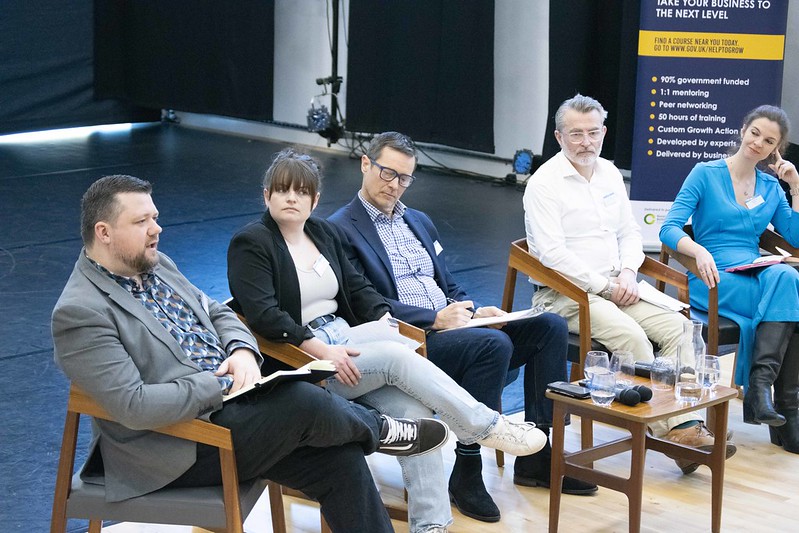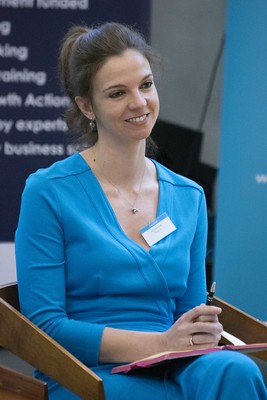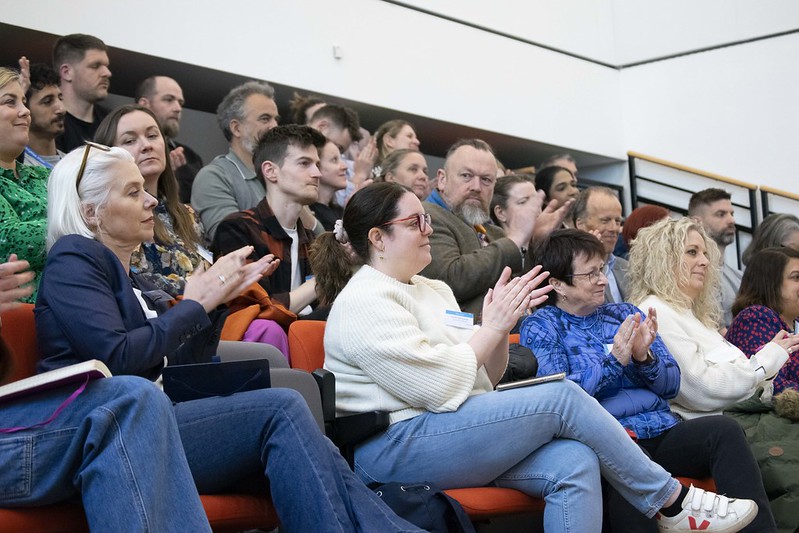

Most of us will, at some point, have to write a bid, tender or pitch for something in our business. But with competition high, how can you stand out from the crowd and write a winning pitch or bid?
We recently hosted a panel event at South East Dance to hear insights from local experts on what makes a winning application. Our chair for the morning, Chris Farthing, CEO of Advice Cloud, led a great discussion with the panel, full of honest advice and practical takeaways. Here are some of the key points they shared.
What’s the difference between grants and tendering?

Kicking us off was Richard Freeman, CEO at always possible, who win 60% of their work through tendering. There’s a lot of similarity between grants and tendering but, there are some key differences:
A grant is investment awarded to a company, driven by policy, usually focused on a collective benefit – such as addressing a deficit in a sector or region that public services can't reach, or boosting economic growth, research or capital investment in particular sectors. Grants are about showing what value you can add to the bigger picture. It’s (usually) a tax-free lump sum, and you have control over the deliverables.
A tender is a request for companies to put forward proposals for goods or services delivery; it’s a contract in which the KPIs are set by the commissioner. A specification will be put out and you’ll put forward your offer to show how you’ll meet the requirements. Tendered contracts are usually worth more than grants, but it is taxable income because it is the delivery of a service.
Where can you look for what’s available?

Let’s Do Business Group’s finance arm – Let's Do Business Finance – are official business support partners of The Start Up Loans Company; delivering Start Up Loans of up to £25,000 to aspiring entrepreneurs and businesses under three years old across the South East. Business Manager, Emily Wright, and her team sift through thousands of applications each year. Her top places to search for grants include:
- Your local Chamber (hi!) can signpost you to funding opportunities in their network or introduce you to people that can help you search.
- East Sussex Council team support with funding opportunities and send out monthly newsletters. Sign up to their newsletters or chat to their team here.
- Brighton & Hove City Council website is another good local source – find newsletters and info here.
- Innovate UK can be daunting at first, but again you can always speak to their team to find the right thing for your business.
With all of these – think about what it is that you’re looking to deliver and work backwards from there. Don’t try and fit your business into something for the sake of it.
How will the Procurement Act affect the University of Brighton, including its approaches for tendering?
The Procurement Act is set to simplify and improve public sector procurement – changing the way public bodies (including the University of Brighton) buy goods and services.
Julian Wood is Head of Procurement and Insurance Services at the University. They spend £52 million annually – from paperclips to buildings and everything in between – with around 25% of that procured locally.
One key change Julian highlighted is a push for more below-threshold (smaller value) contracts to be advertised. Above-threshold contracts now come with stricter requirements, including the need to publish KPIs and report on performance against them.
A new mandated questionnaire (and, yes another new acronym) has also been introduced. The Procurement Specific Questionnaire (PSQ) is stored on a central repository so that you’re not having to re-submit your company details multiple times. It’s early days still, and we can expect to see quite substantial changes in the next couple of years on big contracts.
How can you prepare for writing successful bids and tenders?

Writing bids is a big part of what Jo Sutherland, MD at Magenta, helps clients with — and her top tip? Start early. Monitor portals and network to get a sense of upcoming opportunities. Some of her clients track which contracts are closing when, so they can spot chances to unseat incumbents.
Once the bid lands, it may sound obvious – but make sure you’re answering the questions! Bid writing isn’t PR; procurement teams just want to know you’re a safe pair of hands. Smart bidding = asking smart questions, so if you’re unsure on anything, ask for clarity.
When you’ve got clarity, tell the story of your business and your people. Highlight the skills and experience in your team – even experience gained before they joined you. Don’t be afraid to be creative. And finally, win or lose, always ask for feedback (they’re legally obliged to provide it).
Tips for smaller businesses in securing work
Make sure you’re being proportionate. Richard sees a lot of smaller businesses falling into the trap of putting the same amount of energy into a £10,000 and a £5 million bid, whereas the size should determine the level of those tactics.
Around this, do your homework! If a tender includes additional documents for your interest, comb through them for clues as to what it is they want. And again, use your team, if someone is good at researching, or writing, or have worked on similar projects with clients, get them to help.
Top tips for success in grant applications
Let’s Do Business Finance have approved over 8,500 applications for both Business Loans and Start Up Loans over the past 20 years (totalling over £59 million lent). Emily’s team finds that the applications that stand out not only have a high level of passion, but also show what they want to achieve through the funding pots – as well as what their business will get out of that investment. Think about how this grant can support your business to sustain and grow in the future, or help in a more commercial aspect to you as a key entity.
What to avoid when tendering for University of Brighton contracts?
Some of the common mistakes Julian sees are:
- People talking about the things they want to talk about, no what’s in the tender. Don’t talk about the awards you’ve won – answer the question!
- Generic responses that haven’t been tailored to the organisation. Don’t just send stock answers, think what you would offer and make it obvious it’s a tailored response.
- Look at the weightings – there is always an evaluation framework. Some questions have larger weightings than others so measure your response (and time spent on it) accordingly.
- Respond to all sections – it sounds obvious but if a question has three points, answer them! Legally, they aren’t allowed to ask you to go back and answer something once your tender has been submitted.
Should you be using AI tools for bids and tenders?
Jo acknowledged that AI can sometimes prompt a groan – but her team have been working on developing ways to use AI in bids and tenders, in a way that is both effective and ethical. Jo’s team uses AI to edit and assess – not to write your bids. You can ask it to be the devil’s advocate; refine your language for clarity and impact; cut out the fluff and jargon.
You can also ask AI to score your bids (with a pinch of salt) by feeding it the criteria and weighting. Jo’s caveat here is that AI is a people-pleaser, so ask it to give you more feedback as it will tell you what you want to hear. You can also add in all your previous bids (successful or unsuccessful) and ask it what you did/didn’t do well, and it can use this information moving forwards.
What are the main barriers for winning and what solutions have you found for bids?
Price – price is always a key factor for the University. Julian acknowledges that the sector is challenged at the moment. So if things are equal on price, then quality is next.
Dislodging incumbents – Richard points out that incumbents can become lazy in responses when re-bidding. Track tenders and look at whether they delivered what they were supposed to; review the results and what you could do differently.
Accreditations – ISO can be a big investment for a smaller company. Julian suggests asking for clarity – is it a requirement or is there an alternative equivalent? Richard points out there are less expensive alternatives like cyber essentials plus, becoming a Living Wage employer or a Disability Confident employer.
Cost rises – factor in cost rises with the length of your bid/grant/tender. Break that down and identify it through your grant application or bid.
Making your application stand out – Emily says to think about it from an assessor’s perspective. What will the investment do to affect your future business? Take a look at other applications from your sector. The Arts Council have a list of all their approved applications that have been delivered – look at what they did and do a SWOT analysis of where you differentiate.
Picking the right things – Emily works with small to medium size organisations to map out their business plans before putting them into templates. When you’re trying to make your business work for the funder, rather than the other way around, you’re losing what you deliver on to fit their criteria.

In summary
Tendering alone is not the source of riches. Chris’ closing comments were that everything the panel talked about today was an art and a skill that needs to be practiced – it’s not one and done. Look at what procurement want; whether it’s the right fit for your business; answer all the questions; and don’t be afraid to ask your own!
With thanks to all our chair and panellists for joining us to share their insights and expertise, and to South East Dance for hosting us.
Thanks also to our event partner, Help to Grow and University of Brighton.
If you'd like to find out more about what's available locally, using your Chamber team, get in touch! If we can't help directly, odds are we know someone who can.
The Chamber team have also run the Brighton & Hove Living Wage Campaign for over 12 years. It's free to sign up here.
Photography by Jane Keating Photography.
If you want to contribute to the Chamber blog, contact us on hannah@brightonchamber.co.uk



